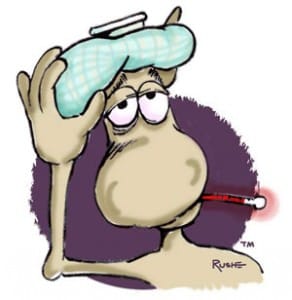 Last night I got a knock on the door around 8:30PM from my assistant barn manager. She told me she thought Tom (one of the older lesson horses) was a little colicky and asked me to take a look. We went out to his stall to find him standing (she said he had been laying down, but had gotten up on his own) quietly. He but had not touched his grain at suppertime and the ABM had removed it along with his hay. His gums were a little pale, but he gave a pretty frisky toss of his head when I tried to check them and did not seem unduly distressed. I went back out to check him around 11PM and he was sleeping standing up. The next morning he was whinnying enthusiastically for his hay. Was this even a colic? I would probably classify it more like gas pain, but it could have turned into colic if his grain and hay had been left in his stall and he had proceeded to eat all of it.
Last night I got a knock on the door around 8:30PM from my assistant barn manager. She told me she thought Tom (one of the older lesson horses) was a little colicky and asked me to take a look. We went out to his stall to find him standing (she said he had been laying down, but had gotten up on his own) quietly. He but had not touched his grain at suppertime and the ABM had removed it along with his hay. His gums were a little pale, but he gave a pretty frisky toss of his head when I tried to check them and did not seem unduly distressed. I went back out to check him around 11PM and he was sleeping standing up. The next morning he was whinnying enthusiastically for his hay. Was this even a colic? I would probably classify it more like gas pain, but it could have turned into colic if his grain and hay had been left in his stall and he had proceeded to eat all of it. This is just one of the reasons it is so important to have staff that are not only observant, but know what to do. And if they don’t know what to do, they find someone (hopefully the barn manager) who does. And if the barn manager doesn’t know what to do, they call the vet. Here’s an example of how this system worked to save Darwin’s life when he coliced:
1) A young apprentice noticed Darwin was acting abnormally (laying down at feeding time). She didn’t know what was wrong with him, but she told a regular staff member.
2) The regular staff member suspected colic, withheld Darwin’s grain, and promptly called the barn manager (me).
3) I treated the colic to the best of my ability and when I saw that Darwin was not responding, I called the vet.
If the apprentice had not told the staff member, Darwin may have gotten back up to his feet and, not suspecting anything was wrong, the staff member would have given him his regular grain. Without the staff member telling me she suspected a colic, I wouldn’t have checked in on Darwin until night check (which would have been four hours later). Meanwhile, during those four hours, he would have been struggling to digest four flakes of hay and three and a half pounds of grain while suffering from a painful impaction colic.
 Your staff doesn’t have to know everything, but they should know a) when something just isn’t right and b) who to tell when they suspect something is wrong. Luckily, I have a wonderful staff, from the apprentices to my ABM, who adhere to this unwritten policy without needing to be told or reminded.
Your staff doesn’t have to know everything, but they should know a) when something just isn’t right and b) who to tell when they suspect something is wrong. Luckily, I have a wonderful staff, from the apprentices to my ABM, who adhere to this unwritten policy without needing to be told or reminded. So what are some common tip offs that a horse just isn’t feeling up to snuff?
 • Off their feed. Horses should be enthusiastic about feeding time. Especially about the stuff that comes out of the grain bin. If they don’t touch their food or only nibble at it, something is up.
• Off their feed. Horses should be enthusiastic about feeding time. Especially about the stuff that comes out of the grain bin. If they don’t touch their food or only nibble at it, something is up. • Lying down. For some horses, this is the norm. But if a horse that usually never lies down is stretched out flat in their stall, they warrant a closer look.
• Abnormal behavior. This can be a little harder to pick up if you don’t know how the horse affected normally behaves and I would not necessarily expect an apprentice to pick up on a horse acting a little oddly, but I do want my staff to know just enough about each horse for them to notice if a normally high strung horse is being quiet and subdued or if a normally stoic horse is acting high strung.
• Lameness. This is an entire series unto itself, but anytime you notice head bobbing, limping, or swelling, you know something isn’t right.
In a perfect world the barn manager would catch everything that was wrong and I would say about 90% of the time a good barn manager will, but with horses timing is everything. The sooner an illness is discovered the sooner it can be diagnosed and treated. If no one notices something is wrong, who is going to call the vet?

No comments:
Post a Comment